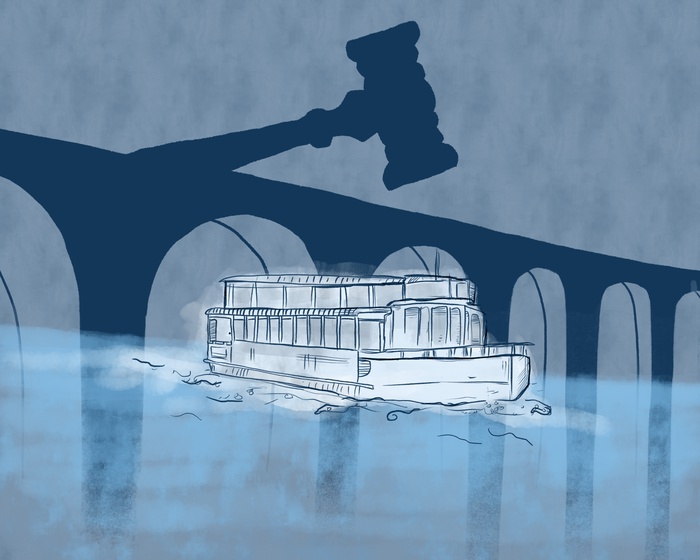{shortcode-0f66b782c0edb6ba950b354d6f845728c24a091b}
{shortcode-be29865d8a9c7908fa05930b7f2d42574eaa573c} was in the back of a packed lecture hall trying to connect the dots between American literature and the economic trends my professor was jabbering about when he mentioned the ferry.
In 1640, the Massachusetts General Court granted Harvard the charter to a ferry that ran between Charlestown and Boston. The ferry was the only way to cross over the Charles River, and with no competition the College operated a virtual monopoly, charging heavy rents and fines to the ferrymen.
Just four years after the College was founded, the ferry served as one of the fledgling institution’s only consistent sources of income. But it wouldn’t be for long.
The first sign of trouble came in the form of a particularly frigid winter in 1752 that left the Charles River covered in ice and untraversable for the ferries. Due to a lapse in business from a surging smallpox epidemic, the College received letters from ferrymen decrying the “two thirds deficiency in passengers” and requesting Harvard lower their rent. The College, under the presidency of Rev. Edward Holyoke, class of 1705, requested the aid of the Massachusetts General Court to settle disputes with the ferrymen.
Soon came the Revolutionary War: As part of their occupation of Boston, the British took control of the ferry, too. The ferry suffered damage amounting to a sum higher than the College was able to afford on its own. The Court came to the rescue once again.
By the third crisis, the ferries faced a fatal blow.
In 1785, The Charles River Bridge Company obtained a charter of its own and built a toll bridge across the river. Knowing that the construction of this bridge would destroy the ferry’s business prospects, Harvard petitioned the Court again and again.
The Court recognized the College’s financial loss, adding a clause into the Charles River Bridge Company contract that ordered the Company to pay an annual sum to Harvard to replace the ferry’s lost income.
Though the company’s toll bridge was a clear improvement, it was far from a perfect development. The toll bridge kept fares high, drawing greater profit margins than many thought necessary.
The Court continued to grant charters for the construction of other bridges — some that were completely free, like that of the Warren Bridge Company — a move that undercut the profits of the Charles River Bridge Company and called into question its ability to sustain its payments to Harvard.
Irritated by the competing charter, the Charles River Bridge Company sued the Warren Bridge Company, arguing that the new charter violated theirs. Interpreting their charter with the Court as granting them a monopoly on transportation between Charlestown and Boston, they invoked the Contract Clause of the Constitution, which says that a state may not impose legislation that prevents it from upholding its contractual obligations. The Massachusetts General Court was split in its decision, and in 1831, the case was brought before the United States Supreme Court.
The Supreme Court, under the direction of Chief Justice Roger Taney, had recently undergone a drastic transformation in the wake of Chief Justice John Marshall’s death. The opening allowed then-President Andrew Jackson to stack the court with justices that heavily favored states’ rights. The Charles River Bridge case was the first important decision to come in front of the reshuffled court. Determined to differentiate itself from its predecessor, the Court ruled in favor of the Warren Bridge Company on the grounds that the General Court must uphold the interests of the public rather than of the company.
The judges were hesitant to interpret the Charles River Bridge Company’s contract as granting monopoly rights at the expense of developments that would make transportation across the river more accessible for Boston’s and Charlestown’s populace.
The Court’s ruling set a precedent that still has implications for economic progress and market competition today. The law still struggles with the question of what it means to value technological progress over the livelihood of one company.
As I anxiously scribbled notes, hanging tightly onto the professor’s words, it finally connected. Between ideas of economic advancement and the pioneering mentality of early American writers, I realized that as we advance, we leave certain people behind.
The Charles River Bridge Company lost revenue until it was forced to declare bankruptcy in 1828 and the annual payments to the College ceased. The College, of course, still exists to this day, but what of the ferrymen that watched their livelihoods dwindle before their own eyes? I wonder where they ended up.
— Associate Magazine Editor Jem K. Williams can be reached at jem.williams@thecrimson.com. Follow her on Twitter @jemkwilliams.


